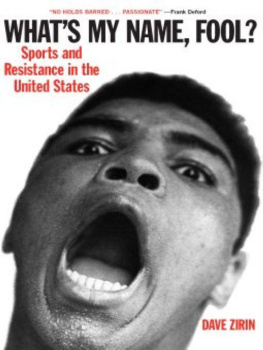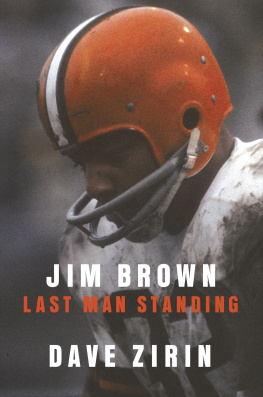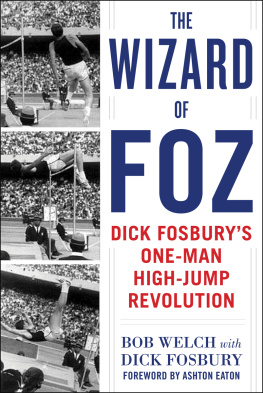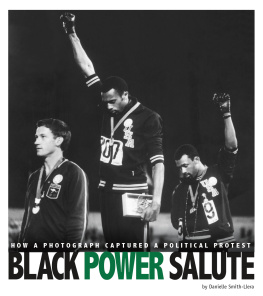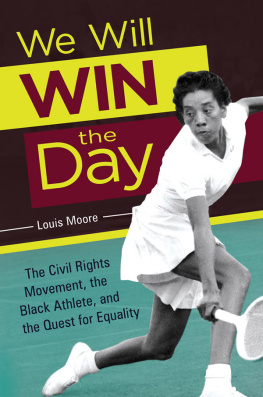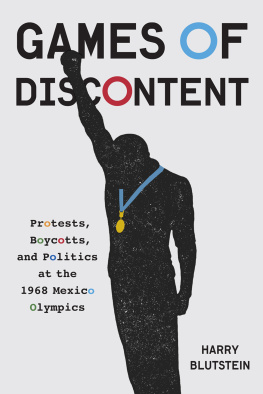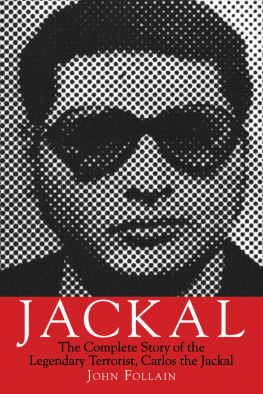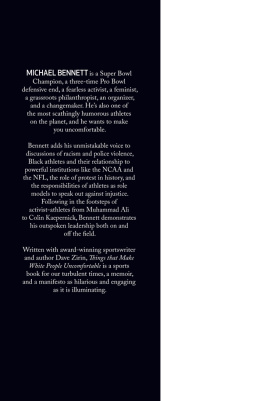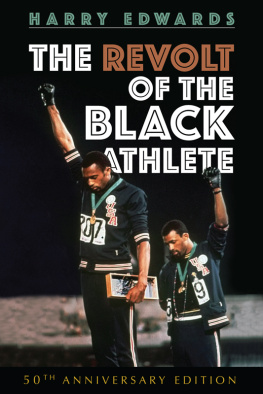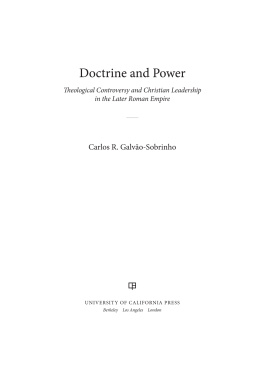Praise for The John Carlos Story
The John Carlos Story is the remarkable chronicle of an epic life sketched against the defining crisis of race in America. Carloss athletic genius on the field is matched by his heroic will to overcome trials and tribulations in his personal life, and to find resurrection in his professional life. This is an inspiring and eloquent story about a great American whose commitment to truth, justice, and democracy were tested and found true.
Michael Eric Dyson, author, Can You Hear Me Now?
John Carloss life story is an insightful and gripping look at the times he lived and the Olympics he helped make so memorable. He shows us that the one day that made him famous was only the most outward and visible sign of a touching and thoughtful life.
Frank Deford, author, Bliss, Remembered
In this breathlessly readable tale, John Carlos finally steps out of that iconic photograph to become the vibrant, fascinating hero we never really knew.
Robert Lipsyte, author, An Accidental Sportswriter
John Carlos tells a compelling story of courage and the consequences of action. He, Tommie Smith, and many other black athletes took a stand against racial injustice in the United States and racial injustice in sports. They were ridiculed by many mainstream commentators at the time, but their actions helped to transform both the sports world and this country. This book is by and about someone who has been and remains one of my heroes.
Bill Fletcher Jr., editorial board member, The Black Commentator
John Carlos was a principal in creating the most iconic sports image of the twentieth century, the demonstration for racial equality and justice from the victory stand at the 1968 Mexico City Olympics. The background and evolution of his perspectives and politics from the vantage point of forty-plus years later is illuminating, inspirational, provocative, and very much worth the read.
Harry Edwards, professor emeritus, University of California, Berkeley, and organizer, 1968 Olympic Project for Human Rights
John Carloss story of bravery and sacrifice will warm your heart. But beyond his individual heroism, it speaks to the power of athletes who bodaciously refuse to just shut up and play. Carlos and Zirin capture the way that through sports, the actions of a few athletes resonate across the globe.
William Hunter, executive director, National Basketball Players Association
If a picture is worth one thousand words, then the defiant image of John Carlos and Tommie Smith, with their clenched black-gloved fists raised high in protest at the 1968 Olympics, must be worth at least one thousand more. In The John Carlos Story, one of those icons from 68 uses his own words to describe that picture and a lifetime of substance that ultimately transcends such a famous moment in time. Providing context to history, The John Carlos Story rocks with the soulful energy of Black Power in this modern time.
Dr. Todd Boyd, author, media commentator, and the Katherine and Frank Price Endowed Chair for the Study of Race and Popular Culture at the USC School of Cinematic Arts
History tells us iconic moments in sports are always enveloped in personal stories of sacrifice, courage, and angst. The lasting images that we see occur in a flash contain enriching back stories that are typically even more significant and tragic than the moment itself. John Carlos and Dave Zirin have combined to tell such a story. The moment that two men stood on the world platform to take a stand after they had become the best in the world is rich, complicated, and, most important, as relevant today as it was in Mexico City. [John Carlos and Dave Zirin] bring out a beautiful and passionate voice of truth to readers in this book about a man who became a legend.
DeMaurice Smith, Director NFL Players Assiciation
The John Carlos Story is a blow-by-blow detailing of triumph versus tragedy from the jump. Again Dave Zirin uncovers and illuminates the mere footnotes of this sports history hero with his impeccable balance of truth. This story drills a hole into the myth of black athlete success and worship.
Chuck D, Public Enemy
2011 John Carlos and Dave Zirin
First published in 2011 by
Haymarket Books
P.O. Box 180165
Chicago, IL 60618
773-583-7884
www.haymarketbooks.org
ISBN: 978-1-60846-127-1
Trade distribution:
In the US, Consortium Book Sales and Distribution, www.cbsd.com
In Canada, Publishers Group Canada, www.pgcbooks.ca
In the UK, Turnaround Publisher Services, www.turnaround-uk.com
In Australia, Palgrave Macmillan, www.palgravemacmillan.com.au
All other countries, Publishers Group Worldwide, www.pgw.com
Cover design by Russell Robinson. Cover image of John Carlos raising his fist in a Black Power salute on the Olympic podium after winning a bronze medal in the 1968 Olympic Games in Mexico City (Associated Press).
This book was published with the generous support of Lannan Foundation and the Wallace Global Fund.
Printed in the United States.
Library of Congress Cataloging-in-Publication data is available.
3 5 7 9 10 8 6 4 2
Contents
Two: Street Level Protest:
You Have Forty-Eight Hours...
First and foremost, all praise to God, the Almighty
To my wife Charlene, my father, Earl, my mother, Vioris, all my brothers and sistersEarl Jr., Mark, and Hepseyand especially to my brother Andrew who left this world too soon on March 13, 2011. This book would have meant so much to him
To my beautiful children, Kimme, Travian, Malik, Shanna, and Winsetta, who were strongest when times were toughest
To my friends and associates Blaine Robinson, Dwane Tillman, and C. D. Jackson
To Dave Cunningham, George Foreman, Tommie Smith, Lee Evans, Wyomia Tyus, and every member of the 1968 Olympic Team
Thank you so much to the beloved principal at Palm Springs High School, Ricky Wright
With all my love and sincerity, to those regular folks around the world fighting for justice from the Midwest of the United States to the Middle East. All they want is what we wanted forty-three years ago: dignity and an acknowledgment of our humanity

John Carlos is one of the grand figures of the twentieth century. His incredible political courage, indisputable athletic excellence, and indestructible spiritual fortitude sets him apart from most contemporary celebrities. In fact, his fame derives from his courage, excellence, and fortitude. Yet it is only in this powerful and poignant memoir that we learn of what he is made and who made him that way.
John Carlos is the human extension of a great family, great community, and great movement. Earl Vanderbilt Carlos and Vioris Carlos gave birth to John on June 5, 1945. His father, born in Camden, South Carolina, was a strong and proud black man in Jim Crow America. His mother, born in Jamaica and raised in Cuba, was a beautiful and determined woman in Jane Crow America. John was Harlem born and Harlem raiseda native son of the Big Apple. Even as a youth, he was on fire for justicefrom his Robin Hood disposition to his precious moments spent with Malcolm X. He was known in the neighborhood for taking a stand for the vulnerable. Like most young black men, John Carlos directed his energy and talent toward sports and entertainment. He excelled in swimmingwinning the New York City 200-meter freestyle championships. And he spent time with the legendary Fred Astaire in front of the famous Savoy Ballroom. Yet ugly racism turned him away from swimming to track and field. And he always retained his love of flair. His dyslexia was a major impediment for academic excellenceyet his quest for wisdom is genuine and endless.
Next page

